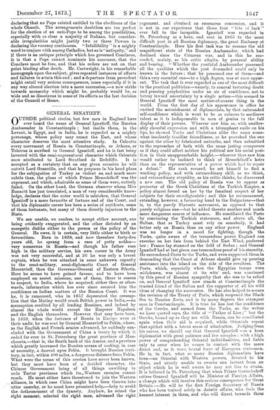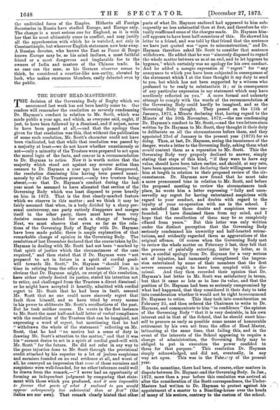GENERAL IGNATTETT.
OUTSIDE political circles, but few men in England have ever heard the name of General Ignatieff, the Russian Ambassador in Constantinople ; but inside them, in the Levant, in Egypt, and in India, he is regarded as a mighty personage, whose policy may recast the East, and whose character deserves the most attentive study. In Calcutta every movement of Russia in Constantinople, or Athens, or Teheran is ascribed to General Ignatieff, and he is fast being invested with the semi-supernatural character which Orientals
once attributed to Lord Stratford de Redcliffe. It is accepted as a certainty that on any given occasion he will outwit Lord Granville, and that he prepares in his head plans for the subjugation of Turkey as violent as, and much more subtle than, the plans of which Prince Menschikoff was the exponent, and which, admirable as some of them were, entirely failed. On the other hand, the German observer whom Miss Bunnett has just translated, a man of very considerable know- ledge, declares that the outer world is mistaken, that General Ignatieff is a mere favourite of fortune and of the Court, and that his diplomatic career has been a series of accidents, some of them fortunate, but many of them directly injurious to the State.
We are unable, we confess, to accept either account, one being evidently exaggerated, and the other dictated by an energetic dislike either to the person or the policy of the General. He owes, it is certain, very little either to birth or favouritism. Born in 1828, and now therefore forty-five years old, he sprang from a race of petty nobles— very numerous in Russia—and though his father rose high in the military service, his own career in the Army was not very successful, and at 26 he was only a brevet captain, when he was attached in some unknown capacity to the semi-military, semi-diplomatic Court of General Mouravieff, then the Governor-General of Eastern Siberia. Here he seems to have gained favour, and to have been employed on' secret missions, one of them, there is reason to suspect, to India, where he acquired, eitherthen or after- wards, information which has ever since secured him the confidence on Indian matters of the Russian Court. It was he, it is, rumoured, who in 1857 deprecated the assump- tion that the Mutiny would crush British power in India,—an assumption credited by all leading Russians, and indeed by almost the whole world except the Emperor Napoleon and the English themselves. However that may have been, in 1859, when the fortunes of Russia in Europe were at their nadir, he was sent by General Mouravieff to Pekin, where, as the English and French armies advanced, he suddenly con- cluded with the Government of China a treaty by which it ceded for ever to St. Petersburg the great province of Man- chooria,—that is, the South bank of the Amoor, and a province which greatly increased the Russian means of making, in case of necessity, a descent upon Pekin. It brought Russian.terri- tory, in fact, within 400 miles, a dangerous distance from Pekin. What were the terms tif this cession have never been known, but they must have been of a decided character, the Chinese .Government being of all things unwilling to cede Tartar provinces which its.Western enemies cannot reach. He must either have threatened to join the Western alliance, in which case China might have been thrown into Litter anarchy, or he must have promised help,—help to avoid the dethronement of the dynasty. Anyhow, he seized the right moment, selected the right man, advanced the right I argument, and obtained an enormous concession, and it is not in our experience that those four "bits of luck" ever fall to the incapable. Ignatieff was regarded in St. Petersburg as a hero, and sent in 1865 to the most difficult post in all Russian diplomacy, the great Embassy at Constantinople. Here his first task was to resume the old magnificent state of the Russian Ambassador, which had declined since the Crimean war, and in this he suc- ceeded, mainly, as his critic admits, by personal ability and bearing. "Whether the youthful Ambassador possessed all the qualities which the post demanded could only be known in the future ; that he possessed one of them—and this a very essential one—to a high degree, was at once appar- ent. The task that is ever regarded as one of the most difficult to the practical politician—namely, to conceal torturing doubt and pressing perplexities under an air of confidence, not to betray inward uncertainty by a single action—this seemed to General Ignatieff the most matter-of-course thing in the world. From the first day of his appearance in office he excited the astonishment of diploniatists, by that unbounded self-confidence which is wont to be as ruinous to mediocre talent as it is indispensable in men of genius to the full display of their powers. Whoever saw him as, with unalter- ably cheerful expression and with a triumphant smile on his lips, he showed Turks and Christians alike the same some- what insolently familiar friendliness, as he provoked the one against the other by fabricated untruths, and then submitted to the reproaches of both with the same jesting composure as if they could affect neither his political nor his social posi- tion in their unapproachable height,—whoever thus saw him would rather be inclined to think of Menschikoff's heirs than on the representative of a power which had to repair a defeat." His rank secured, he set himself to find a working policy, and with extraordinary skill, as we think, and extraordinary stupidity, as his critic thinks, he discovered a new one. The old policy of Russia was to appear as protector of the Greek Christians of the Turkish Empire, a policy almost forced on her by the fanatical respect of her subjects for their co-religionists ; and this he recommenced, extending, however, a favouring hand to the Bulgarians—that is, to the purely Slavonic movement, as opposed to that purely religious one—but he added thereto another and much more dangerous source of influence. He conciliated the Porte by convincing the Turkish statesmen, and above all, the Sultan, that as Turkey must rely on somebody, it had better rely on Russia than on any other power. England was no longer in a mood for fighting, though the Turks, quite aware of the tremendous power England can exercise on her fate from behind the East Wind, preferred her ; France lay stunned on the field of Sedan; and General Ignatieff had at last given one tremendous proof of his sincerity. He surrendered Crete to the Turks, and even supported them in demanding that the Court of Athens should give up pouring assistance into the island on the side of the revolters. The Porte, which, especially when the Egyptian troops were withdrawn, was almost at its wits' end, was convinced by this proof of Russian sympathy that she was to be relied on, and General Ignatieff now stands at Constantinople the trusted friend of the Sultan and the supporter of all his wild ideas of changing the succession. He has also helped to secure the revision of the Treaty of Paris, which reopened the Black. Sea to Russian fleets, and is by many degrees the strongest man in Constantinople. It is true he has lost the confidence of the Greeks, and earned from the Turks, as the writer we have quoted says, the title of "Father of Lies ;" but the Greeks, bound up as they are with Russia, can be conciliated again when their aid is required, while Orientals repeat that epithet with a latent sense of admiration. Judging from his career, we should say that General Ignatieff was a keen diplomatist with great patience and few scruples ; with a high power of comprehending Oriental individualities, and liable only to error when he comes in contact with the more direct and, as it were, brutal force of European statesmen. He is, in fact, what so many Russian diplomatists have been—an Oriental with Western powers, devoted to his State, and utterly unable to swerve one instant from .an object .which he is well aware he may not live to attain. It is believed in St. Petersburg that when Prince Gortscbakoff retires General Ignatieff will be Minister of Foreign Affairs, a change which will involve this serious consequence for Great Britain :—He will be the first Foreign Secretary of Russia who has been trained solely in Asiatic affairs, who feels the keenest interest in them, and who will direct towards them
the undivided force of the Empire. Hitherto all Foreign Secretaries in Russia have studied Europe, and Europe only. The change is a most serious one for England, as it is with her that he must ultimately come in conflict, and may justify all the apprehension with which he is watched, not only in Constantinople, but wherever English statesmen now bear sway. A Russian devotee, who knows the East as Pozzo di Borgo knows Europe may be, as his mind inclines, a most faithful friend or a most dangerous and implacable foe to the owners of India and masters of the Chinese trade. In no case can the man, as his German observer seems to think, be considered a courtier-like non-entity, elevated by luck, who makes enormous blunders, easily detected even by the public.



































 Previous page
Previous page